
Phyllis: February is the month of valentines and lovers, and we spent a day (through his books) with someone we love: Arnold Lobel.
He wrote easy reader stories that help children crack the code of reading, give them fun stories with characters who remind us of people we know and that give readers of all ages plenty to think about. In his fifty-four years, he illustrated almost a hundred children’s stories and wrote many of them.
An editor once, when asked if Arnold Lobel was more like Frog or Toad, responded, after thinking about it, that he is more like Owl.
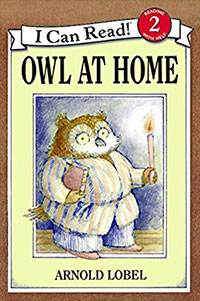 Jackie: Sometimes I read Owl at Home just to myself. What do we love about owl? Owl is always on the edge of sadness. He has a young child’s partial understanding of the world. Kids can see themselves in Owl — and sometimes they can see that they even know more than owl. Part of the joy of the story “Strange Bumps” is that kids know what the bumps are. When the two strange bumps at the foot of Owl’s bed obsess him, Owl looks under covers. No bumps. He pulls the covers back up and there are the bumps. He jumps up and down yelling, “Bumps. Bumps. Bumps, I will never sleep tonight.” And when the bed collapses, he leaves it to the bumps and goes downstairs to sleep in a chair. He never identifies the bumps. But readers do.
Jackie: Sometimes I read Owl at Home just to myself. What do we love about owl? Owl is always on the edge of sadness. He has a young child’s partial understanding of the world. Kids can see themselves in Owl — and sometimes they can see that they even know more than owl. Part of the joy of the story “Strange Bumps” is that kids know what the bumps are. When the two strange bumps at the foot of Owl’s bed obsess him, Owl looks under covers. No bumps. He pulls the covers back up and there are the bumps. He jumps up and down yelling, “Bumps. Bumps. Bumps, I will never sleep tonight.” And when the bed collapses, he leaves it to the bumps and goes downstairs to sleep in a chair. He never identifies the bumps. But readers do.
Phyllis: “Tearwater Tea” is another story that always satisfies. One afternoon Owl decides to brew a pot of tearwater tea. He thinks of things that are sad– chairs with broken legs, songs that cannot be sung because the words are forgotten, books that cannot be read because some of the pages have been torn out. After a while he has accumulated sufficient tears. He puts his tea kettle on and makes the tea. That cheers him up because, even though it tastes salty, “Tearwater tea is always very good.”
In the last story, the moon seems to follow Owl home despite his protestations that he has nothing to give the moon for supper and has a very small house. When the moon disappears behind a cloud, he says, “It is always a little sad to say good-bye to a friend.” But the moon reappears at his window and Owl says, “Moon you have followed me home, what a good round friend you are.” Owl doesn’t feel sad at all In these brief chapters. So, Owl goes through sadness to the other side. A progression.
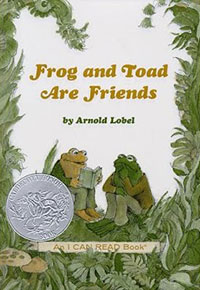 Jackie: When we read the Frog and Toad stories to our children we read them with joy and the pleasure of sharing with our kids and didn’t necessarily look deeper into them. The Frog and Toad books are a primer on the ups and downs of friendship — including the foibles and quibbles of being a good friend. In “Spring” (Frog and Toad are Friends) Frog tricks Toad into waking up early from his winter nap because Frog is lonely without Toad. Frog is not above laughing at his friend. In “A Swim” (Frog and Toad are Friends) Toad refuses to come out of the water because, he says, “I do not want [anyone] to see me in my bathing suit.” He is worried they will laugh. Eventually the turtle, lizard, snake, dragonflies, and a field mouse sit on the riverbank waiting to see if toad looks funny. Eventually Toad has to come out of the water. He is catching cold. As Toad predicted, everyone laughs, including Frog, who says “You do look funny in your bathing suit.” “’Of course I do,’ said Toad, and he picked up his clothes and went home.”
Jackie: When we read the Frog and Toad stories to our children we read them with joy and the pleasure of sharing with our kids and didn’t necessarily look deeper into them. The Frog and Toad books are a primer on the ups and downs of friendship — including the foibles and quibbles of being a good friend. In “Spring” (Frog and Toad are Friends) Frog tricks Toad into waking up early from his winter nap because Frog is lonely without Toad. Frog is not above laughing at his friend. In “A Swim” (Frog and Toad are Friends) Toad refuses to come out of the water because, he says, “I do not want [anyone] to see me in my bathing suit.” He is worried they will laugh. Eventually the turtle, lizard, snake, dragonflies, and a field mouse sit on the riverbank waiting to see if toad looks funny. Eventually Toad has to come out of the water. He is catching cold. As Toad predicted, everyone laughs, including Frog, who says “You do look funny in your bathing suit.” “’Of course I do,’ said Toad, and he picked up his clothes and went home.”
They don’t always see eye to amphibian eye. In “Cookies” (Frog and Toad Are Friends) Frog, in pursuit of willpower so as not to eat all the cookies Toad has baked, ends up giving them to the birds. “Toad goes into the house to bake a cake.”
Phyllis: And who doesn’t recognize themselves in “The List,” where, when the list blows away, Toad claims he can’t run after it because “Running after my list is not one of the things I wrote on my list of things to do?”
In “The Story” (Frog and Toad Are Friends) Frog is sick (“looking quite green”) and he asks Toad for a story. Writers will recognize what Toad does when he cannot think of a story. He walks up and down, he stands on his head, he pours a glass of water over his head, but he still cannot think of a story. He bangs his head against the wall. By then Frog feels better, Toad feels worse and asks Frog for a story. Frog tells Toad the story of the Toad who could not think of a story. We can’t help but think this delightful tale is perhaps based on a day when Lobel could not think of a story.
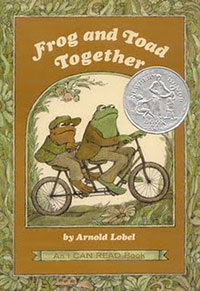 In “The Dream (Frog and Toad Together),” Toad has a dream where he cannot fail. He plays the piano, he dances, he walks on the high wire while a voice proclaims that he is “The Greatest Toad in the World.” Each time he asks Frog if he, too, could do these wonderful things. Each time Frog says no and shrinks a bit until Toad says, ”Frog, can you be as wonderful as this?” There is no answer. Frog has shrunk so small that he cannot be seen or heard. Toad shouts at the voice proclaiming his greatness to shut up and says, “Come back Frog. I will be lonely.” He is desperate. Then Toad wakes from his dream to see Frog, who says, “I am right here, Toad.” “I am so glad you came over,” says Toad. “I always do,” said Frog.
In “The Dream (Frog and Toad Together),” Toad has a dream where he cannot fail. He plays the piano, he dances, he walks on the high wire while a voice proclaims that he is “The Greatest Toad in the World.” Each time he asks Frog if he, too, could do these wonderful things. Each time Frog says no and shrinks a bit until Toad says, ”Frog, can you be as wonderful as this?” There is no answer. Frog has shrunk so small that he cannot be seen or heard. Toad shouts at the voice proclaiming his greatness to shut up and says, “Come back Frog. I will be lonely.” He is desperate. Then Toad wakes from his dream to see Frog, who says, “I am right here, Toad.” “I am so glad you came over,” says Toad. “I always do,” said Frog.
Forty years later their friendship is still comforting to readers of all ages.
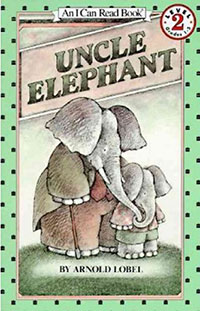 Jackie: We can’t leave this appreciation without a mention of Uncle Elephant, in which a wise Uncle Elephant comforts his lonely elephant nephew when his father and mother do not come back from sea. On the train to Uncle Elephant’s, they eat peanuts, count houses and telephone poles, and finally peanut shells, which are much easier to count. Uncle Elephant introduces his nephew to the flowers in his garden, his favorite place in the world. They make crowns of flowers and trumpet the dawn together. Uncle Elephant tells him a story about a king with many wrinkles and a prince who was young and smart. When they meet a lion, they trumpet so loudly every one of the lion’s teeth pop out. When little elephant gets sad, Uncle Elephant puts on all his clothes at once to make the little elephant smile. They end up laughing so hard at the “pile of clothes with two ears” that they forget to feel sad. They sing a song together, and they dance for joy when little elephant’s mother and father are found and return home. On the train Uncle Elephant counts the wonderful days that they had spent together, and they promise to see each other often. Uncle Elephant is the calmest, best-listening uncle ever there was. He hears what the little elephant can’t even say about fear and sadness.
Jackie: We can’t leave this appreciation without a mention of Uncle Elephant, in which a wise Uncle Elephant comforts his lonely elephant nephew when his father and mother do not come back from sea. On the train to Uncle Elephant’s, they eat peanuts, count houses and telephone poles, and finally peanut shells, which are much easier to count. Uncle Elephant introduces his nephew to the flowers in his garden, his favorite place in the world. They make crowns of flowers and trumpet the dawn together. Uncle Elephant tells him a story about a king with many wrinkles and a prince who was young and smart. When they meet a lion, they trumpet so loudly every one of the lion’s teeth pop out. When little elephant gets sad, Uncle Elephant puts on all his clothes at once to make the little elephant smile. They end up laughing so hard at the “pile of clothes with two ears” that they forget to feel sad. They sing a song together, and they dance for joy when little elephant’s mother and father are found and return home. On the train Uncle Elephant counts the wonderful days that they had spent together, and they promise to see each other often. Uncle Elephant is the calmest, best-listening uncle ever there was. He hears what the little elephant can’t even say about fear and sadness.
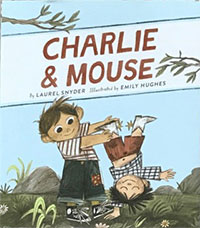 Phyllis: He offers small comforts in the face of great of loss. We hope you all get to spend a day with Arnold Lobel and Frog and Toad and Grasshopper and Owl and Mouse and Uncle Elephant — soon — for silliness and comfort and friendship.
Phyllis: He offers small comforts in the face of great of loss. We hope you all get to spend a day with Arnold Lobel and Frog and Toad and Grasshopper and Owl and Mouse and Uncle Elephant — soon — for silliness and comfort and friendship.
Sidebar: We just want to mention stories written in the same spirit as Arnold Lobel’s stories, Charlie and Mouse, easy readers by Laurel Snyder, which was just named winner of the Geisel Medal, the ALA prize for Best Easy Reader of 2017.

Oh, how I wish I would have had the opportunity to meet Arnold Lobel in person! Thank you for this reminder of his wonderful books!
David, I think he would have loved knowing you!